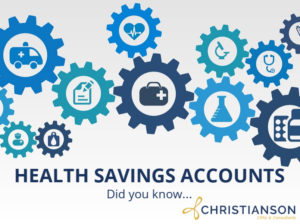 If you have a Health Savings Account (HSA) (or even if you don’t), there may be some benefits that you don’t know about. Most people understand the benefits of tax-free contributions, tax-free earnings, and tax-free withdrawals for qualified healthcare expenses. While designed primarily to help reduce the financial burden of healthcare, HSAs have some relatively unknown benefits as well. Today, we dive into those.
If you have a Health Savings Account (HSA) (or even if you don’t), there may be some benefits that you don’t know about. Most people understand the benefits of tax-free contributions, tax-free earnings, and tax-free withdrawals for qualified healthcare expenses. While designed primarily to help reduce the financial burden of healthcare, HSAs have some relatively unknown benefits as well. Today, we dive into those.
My Employer Doesn’t Offer HSA
Did you know: even if your employer does not offer an HSA, you can still set one up at many local banks as long as you have a qualifying health plan. For 2020, a self-only health plan needs to have a minimum annual deductible of $1,400 and maximum annual deductible/out of pocket expenses of $6,900 and a family health plan needs to have a minimum annual deductible of $2,800 and maximum annual deductible/out of pocket expenses of $13,800.
If you had a qualifying health plan during the tax year, you have until the tax deadline to set up an HSA and contribute for the prior year.
I Don’t Have Enough Funds in HSA
Did you know: if you have a health savings account through your employer and you incur medical expenses and do not have enough funds in HSA, you can write a check directly to the servicer of your account. You may then deduct the extra contributions when you file your tax return.
What if I Paid Out of Pocket for Health Expenses?
Did you know: if you have an HSA set up and pay expenses out of pocket, you can reimburse yourself for expenses paid. Many people pay out of pocket all year and then write themselves a check from their health savings account at the end of the year.
For example, a family pays medical expenses out of pocket for the entire year. At the end of the year, they add up the expenses paid and those expenses total $6,000. They can write a check to their HSA for the $6,000 and immediately reimburse themselves by writing another check from the HSA to themselves. They will get a $6,000 above the line tax deduction when they file their taxes. There is also no “expiration” of the expenses. As long as you had an HSA at the time you paid the expense out of pocket, you can reimburse yourself.
Don’t My Funds Expire?
The money in your health savings account can accumulate and does not “expire” like a medical flex plan. Some HSA servicers even allow funds in your HSA to be invested, which allows the account to grow similar to a retirement account. HSA funds can also be withdrawn for non-medical reasons, however since contributions are pre-tax/tax deductible, if funds are withdrawn for non-medical reasons the distributions are taxable and if under the age of 65 a 20% penalty will also apply.
What Can I Buy With My Money?
The IRS issues an annual publication of qualified expenses. Recently the CARES Act opened up additional qualifiers that your HSA dollars can purchase legitimately. Previously the only Over the Counter (OTC) items covered without a prescription were bandages and pregnancy tests. Now your cold and flu products, pain relief medication, allergy products, heartburn medications and menstrual products will qualify. The change is retroactive back to January 1, 2020 and is permanently in place.
If you have other questions that relate to your options for Health Savings Accounts, contact our experts today!
[button_1 text=”Contact%20Christianson%20Today!” text_size=”15″ text_color=”#ffffff” text_font=”Lato;google” text_letter_spacing=”1″ subtext_panel=”N” text_shadow_panel=”N” styling_width=”30″ styling_height=”20″ styling_border_color=”#ffffff” styling_border_size=”5″ styling_border_radius=”23″ styling_border_opacity=”100″ styling_gradient_start_color=”#1b335d” styling_gradient_end_color=”#1b335d” drop_shadow_panel=”N” inset_shadow_panel=”N” align=”center” href=”https://www.christiansoncpa.com/contact-us/”/]